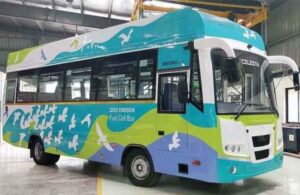Treading its path towards cleaner mobility, Union Minister Jitendra Singh has introduced India’s first truly indigenously developed Hydrogen Fuel Cell Bus.
 Developed by KPIT-CSIR in Pune, the fuel cell utilizes Hydrogen and Air to generate electricity to power the bus and the only effluent from the bus is water, thus making it possibly the most environmentally friendly mode of transportation.
Developed by KPIT-CSIR in Pune, the fuel cell utilizes Hydrogen and Air to generate electricity to power the bus and the only effluent from the bus is water, thus making it possibly the most environmentally friendly mode of transportation.
The uniqueness of the Hydrogen Fuel Cell Bus process by CSIR-NCL is a novel downstream process technology, which makes this indigenous technology competitive with global benchmarks.
The process is ready for technology transfer and further co-development to commercial scale.
Earlier in March this year, Union Minister of Road Transport & Highways Nitin Gadkari inaugurated and demonstrated a pilot project of Toyota Mirai FCEV, which is an electric sedan car based on Hydrogen Fuel Cell technology.
Jitendra Singh told the gathering that Prime Minister Modi’s Hydrogen Vision is important for India to ensure Atma Nirbhar means of affordable and accessible clean energy, meeting climate change goals, and creating new entrepreneurs and jobs.
He said, Green hydrogen is an excellent clean energy vector that enables deep decarbonization of difficult-to-abate emissions from the refining industry, fertiliser industry, steel industry, cement industry and also from the heavy commercial transportation sector.
To recall, Indian Railways too is exploring the feasibility of retrofitting the trains (that presently run on diesel) with hydrogen fuel and for same it invited bids for “hydrogen fuel cell-based technology” for retrofitting the existing Diesel units.
The high efficiency of fuel cell vehicles and the high energy density of hydrogen ensures that the operational costs in rupees per kilometre for fuel cell trucks and buses are lower than diesel powered vehicles and this can bring freight revolution in India. Moreover, Fuel Cell vehicles also give zero green-house gas emissions.
The Minister lauded the joint development efforts of KPIT and CSIR-NCL and pointed out that the technology prowess of Indian scientists and engineers is no less than the best in the world and also at much lower costs.
Jitendra Singh pointed out that about 12-14% CO2 emissions and particulate emissions come from diesel powered heavy commercial vehicles and these are decentralized emissions and hence difficult to capture.
The Minister said, Hydrogen Fuel Cell Bus and vehicles provide an excellent means to eliminate the on-road emissions from this sector.
He said, India is also aiming to increase inland waterways for freight and passenger transport.
Jitendra Singh concluded that by achieving these goals, India can pole-vault from being net importer of fossil energy to becoming net exporter of clean hydrogen energy and thus, providing global leadership to India in hydrogen space by becoming a large green hydrogen producer and supplier of equipment for green hydrogen.
